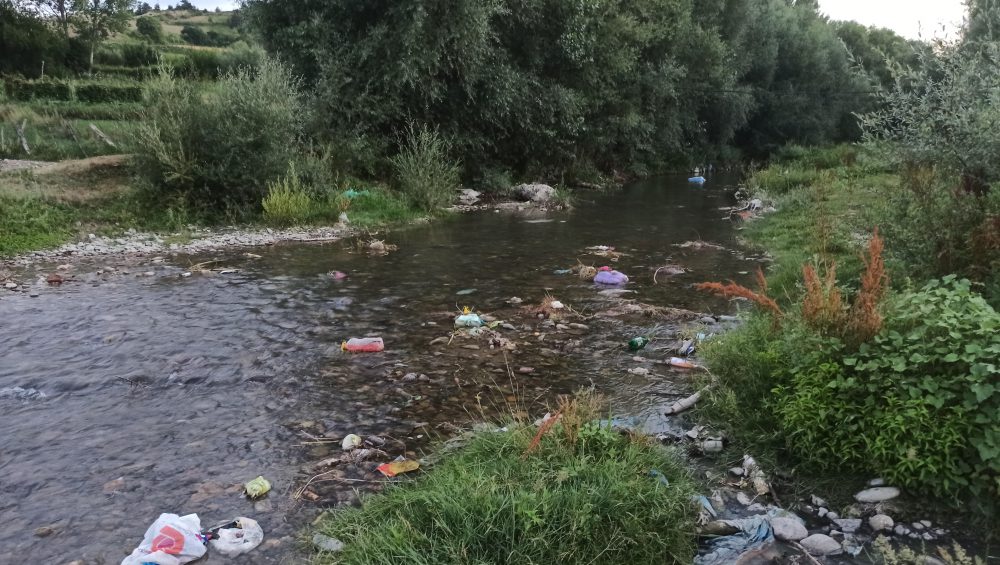In the timbre of the voice of the elderly gentleman standing at the door of the two-story house, on the side of the road in Bilisht, one can see the nostalgia for a bygone time, when the Devoll river was drained and clean. The “blame” is on democracy that today the water of the river it grew up with has turned black, while piles of inerts and garbage stand next to it.
“The water was clean, even drinking, very clean”, – recalls the 77-year-old man, who does not want to be identified. The abuse of rivers takes him back to the earlier years, where according to him the river was treated differently by the authoritarian state.
“At the time of monism, the cooperative left two people responsible for the river. Cattle, where you were allowed to enter, cattle were entered, where you were not allowed, they were not. He planted poplars and did not allow cattle. Second, don’t bother to take the sand, one or the other”, he continues.
Time walks refer to the well-being of the Devoll river, which is 196 kilometers long and originates from the Morava mountain, to continue in the Miras administrative unit in the Devoll municipality, part of the Korça district. Then, Devolli follows its journey until joining Osum in Berat, thus forming Seman, which flows into the Adriatic Sea.
The stream of Devoll is joined by many branches, which describe almost 44 villages of the Municipality of Devoll. Its main branches are the Dunavec river, the Selca river, the Shënepremte river, the Tomorrica river and the Holta river.
“The bad things come from the river”, says Margarita Buxhaku, executive director of the Albanian Center for Environmental Governance (ACEG), as she lists what has caused the pollution of the Devoll river over the years. She lists factors such as household waste, which in recent years has been somewhat addressed, green waste and sewage.
THE GERMAN GOVERNMENT FINANCES THE CONSTRUCTION OF THE MALIKI LANDFILL
The German government, through the German Development Bank (KfW), in cooperation with the Albanian government, has invested 14 million euros for the construction of the Maliqi landfill, an investment which treats the waste of six municipalities; Devoll, Kolonje, Korçë, Maliq, Pustec and Pogradec, part of Korçë district. This landfill has been operational since 2018.
In the Maliqi landfill, only urban waste is treated as far as Devoll Municipality is concerned, while green and inert waste is not treated. These last two end up in the river, because sending them to the landfill for treatment would increase taxes for citizens more.
Margen Skoti from the company “Alko Impex Construction”, which has won the tender for the cleaning service of Devoll Municipality for several years in a row, claims that per month, this municipality produces 350-400 tons of household waste that is taken to the Maliqi landfill for treatment.
The treatment of one ton of waste costs around 16-18 euros, he continues. It costs the Devoll Municipality about 5,600-6,400 euros a month to treat household waste in this landfill.
The high cost has left unresolved the very problematic situation of green waste, since the production of this waste is also very high. The sale of agricultural products is the main economic activity for the citizens of Devolli Municipality.
According to data published in INSTAT, in the years 2018-2020, 34,319 tons of vegetables were produced in Devoll Municipality.

For the year 2020, INSTAT informs, the district of Korça maintains the highest level of production of fruit trees in Albania, with 82,007 tons.
“As an area which is mainly based on agriculture and livestock, the trade of products which often remain in stock or are sold below cost remains a constant problem”, – it is written in the “Barometer of Agriculture” report.
And when the products remain in stock, “the bad ones are taken by the river”.
“Not selling apples, which happens often… they end up in the river in March”, says Margarita Buxhaku. Constant national media reports prove this. It often turns the rivers into a dumping ground for dumping labor and apples or other unsold products of the villagers.
DRILLED “BINS” FOR RESIDENTS
In the administrative unit of Mirastë, several metal barrels placed on the side of the road, perforated, which had the function of waste bins, caught the eye, at different distances. Their drilling came as a “preventive” measure against the residents, who have “robbed” the stashed barrels quite a few times, to use them for other functions.
“The barrels were drilled by the company because when they were first installed, the residents took them, put them inside and filled them with grain, and to avoid this part, the company drills them before taking them to the village and placing them those”, – explains Buxhak.
The company “AlkoImpex Construction” has won the tender for the cleaning service of Devoll Municipality for several years in a row, which makes it responsible for the supply of bins and the maintenance of the city. Perforated barrels instead of normal containers, Baxhak confesses, were placed on the grounds that the road infrastructure is not suitable.
“The firm argued that the reason for not having normal disposal bins is that there is not enough road infrastructure for suitable cars to enter”, continues Margarita Buxhaku, “but it must be said that in 44 villages in Devoll there may be only two or three that they are in very deep areas where there are no paved roads”.
The lack of infrastructure is also confirmed by Margen Skoti, representative of the company “Alko Impex Construction” and responsible for the maintenance of the municipality of Devolli. He further stated that the problem of oil barrels instead of bins has been solved, as they have recently replaced them.
“There is no chance that the bins are punctured, a few weeks ago I received a shipment of 35 bins and I changed them, they are all new”.
“They stole them from us, disturbed us, took our caps and sold them for scrap”, he says, referring to the drilling of the barrels as a preventive measure to prevent the residents from taking the oil barrels that were placed on the site of containers.
However, Scott claims that 80% of the city’s cleaning service is done through doorstep delivery, where it is collected three times a week.
On the other hand, residents are somewhat satisfied with the way some of the waste is handled. In addition to the bins, they confirm that they collect the household waste and leave it outside the door of the house, which is taken by the company and sent for treatment to the Maliqi landfill.
“I personally prepare them in bags. On Wednesday or Saturday when the car comes, we leave them outside by the door, in the morning they collect them and leave”, – says a boy from the village of Baban.
NO WASTEWATER TREATMENT PLAN
Florenc Zyfi, from the Municipality of Devolli, said that the situation of the water used is quite problematic.
“As a municipality, we are still in the phase of extracting waste water from residential areas, because it is a problematic situation in all of Devolli”, Zyfi asserted.
“At the moment we do not have any kind of solution to eliminate sewage from the rivers”, he said. In addition to sewage, many chemicals end up in the river as a result of intensive agricultural activity.
“The pesticide treatment of orchards in the area, even the kind of waste that is generated by pesticides, still end up in the river, in addition to the water used by family members, they also end up in the river”, Margarita Buxhaku quotes.
All these problems, residents say, have turned the river into a stream that is difficult to cross.
“Each branch that joins the river of Devolli has sewage, from every village. You can’t go for lunch because of the wind”, says a citizen from the village of Babani.
Another passer-by in Bilisht proudly shows that she is from Hoçishti, an area that has produced intellectual and outstanding people. Besides the concern about the pollution of the river and the bad smell it carries, she refers to the other concern, that of the narrowing of the Devoll river flow.
In fear of the torrential rains, some of the residents have planted trees to prevent flooding of the fields and erosion.
“They have narrowed the rivers, where I can complain once. They have occupied the lands. It has become that river of tears, as it used to be. The river is wide, good, clean, we bathed, we drank water because we worked in the cooperative and we didn’t have many sources in the field. Where you drink now, it’s stinky water”, she says, as she asks not to be identified as she is afraid that she could cause trouble for her son.
ACEG, together with the Municipality of Devoll, finalized in 2018 the project “Building a bridge of cooperation between the municipality, civil society and the community for waste management in the Municipality of Devoll”( only in Albanian), financed by the Swedish Embassy in Albania, a project which aimed to raise awareness and cooperation with the community to turn a landfill into a children’s park.
Three years later, the park has been completely destroyed and the bed of the river Devoll that runs through Miras has once again turned into a landfill. A herd of sheep pass by the river and feed on scraps lying on the other side.
Margarita Baxhaku says that they expected such a result. She sadly affirms the current state of the river, which does not match at all with her childhood images, and even less with her vision as an environmental activist.
“The village where I grew up describes one of the branches of Devolli. The Devoll river originates from the Morava mountain and is clean, drinkable water, and fish once grew and all the inhabitants ate fish. This vision is; to bring life back to that river”, concludes Margarita Buxhaku.
From Entenela Ndrevataj












